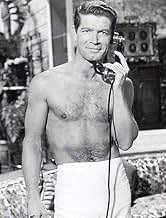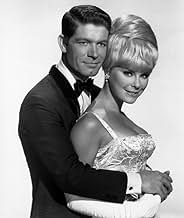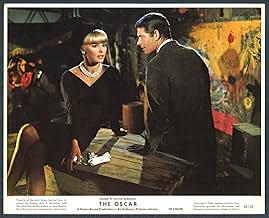Un arrogante actor de Hollywood se vuelve más arrogante si cabe tras ser nominado para el Oscar.Un arrogante actor de Hollywood se vuelve más arrogante si cabe tras ser nominado para el Oscar.Un arrogante actor de Hollywood se vuelve más arrogante si cabe tras ser nominado para el Oscar.
- Nominado para 2 premios Óscar
- 3 nominaciones en total
Argumento
¿Sabías que...?
- CuriosidadesPeter Lawford: a washed-up actor working as a restaurant host. It wasn't that different from Lawford's real-life situation at the time. After a falling out with Frank Sinatra got him banished from The Rat Pack, Lawford found on-screen work hard to come by.
- PifiasThe newspaper photos of Cheryl Barker hitting Frankie don't match the scene when it happens. She could have hit him twice (she was angry enough), and the photographers might have caught the second hit.
- Citas
Hymie Kelly: [narrating] Frankie wanted the town to be aware he was alive and he knew how to do it. Man, he wanted to swallow Hollywood like a cat with a canary. And he did it. The parts got bigger, and Frankie was hooked. Like a junkie shooting pure quicksilver into his veins. Frankie got turned on the wildest narcotic known to mortal man: Success. And he needed larger and larger doses. As the years went by, it became part of his life like air. The attention, the recognition. Now he was somebody. He was always too hungry. Too much and too far ahead of himself. He bought a Rolls before he could afford it. He bought the mansion in Bel Air. He went the route. The interiors were from the best shops on decorators row. Even Sam the houseboy was imported. Frankie played the part for real, the whole image. He had arrived.
- ConexionesEdited from The 37th Annual Academy Awards (1965)
- Banda sonoraThanks for the Memory
by Leo Robin and Ralph Rainger
In reality, according to many who were there in Hollywood and Vegas during Sinatra's heyday and fell inside his considerable orbit of influence, 'Ol Blue Eyes was more full of himself, and could be even more difficult to be around, than the character of Fane, as created by author Richard Sale in the novel and effectively portrayed here by Stephen Boyd.
Sinatra, in fact, would have been a more realistic Fane than Boyd...because the character he was playing was not too far off himself. Yet, when Oscar presenter Merle Oberon, at the film's conclusion, says, "...Frank.....SINATRA (not Fane)...!" as the winner for Best Actor, everyone stands and applauds. For all his iconoclasm throughout his career and life, Sinatra suddenly has become Establishment.
As for "The Oscar" itself, it's like watching an accident. We're filled with a kind of shocked fascination, so we continue to watch. A major question here is why all those excellent professionals---Joseph Cotten, Ernest Borgnine, Eleanor Parker, Broderick Crawford, Walter Brennan---chose to be a part of this trite, unrealistic tale of Hollywood.
As Fane, Boyd projects a sarcastic, sometimes vicious---though at times curiously vulnerable---persona. Elke Sommer is at her physically charismatic best. And her acting is surprisingly good.
Tony Bennett, though, is the metaphor for all that is laughable in "The Oscar". He portrays Fane's pal, Hymie Kelly, with cartoonish over-acting.
Milton Berle, as agent Kappy Kapsetter, shows how solid a straight actor he could be. All those prominent people who have smaller roles here do creditable jobs.
About the same time "The Oscar" came out, in 1966, Broadway was doing the Budd Schulberg story, "What Makes Sammy Run?" Its theme, and that of "The Oscar", are similar: sooner or later, those who step on others on the way up will get smacked back down.
After what was done on the screen to "The Oscar", Schulberg probably was happy his story never was made into a film.
- halmp-1
- 23 jul 2003
- Enlace permanente
Selecciones populares
- How long is The Oscar?Con tecnología de Alexa
Detalles
Taquilla
- Presupuesto
- 3.000.000 US$ (estimación)
- Duración1 hora 59 minutos
- Relación de aspecto
- 1.66 : 1
Contribuir a esta página








































